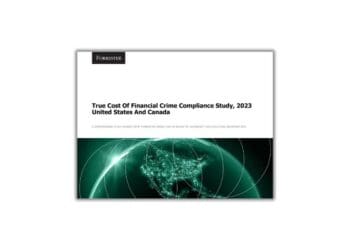The New Solutions for Financial Crimes Compliance Management (FCCM)
The methods for perpetrating fraud are continually evolving, so an effective approach for fighting fraud must change with the times. Ajay Katara discusses further why banks must adopt newer technologies to prevent and detect financial crimes.
With the dawn of the digital age, financial crimes against banks are increasing at a rapid pace. Though the banks are investing in this space to contain them, the financial crimes compliance management (FCCM) processes continue to add sizeable costs to banking organizations, making them lean on newer technologies for better controls and improved efficiencies.
Though there are number of systems banks leverage to maintain and manage their FCCM processes, still there are many opportunities and touchpoints that can benefit from automation and analytical capabilities to gain required efficiencies.
One such area is fraud management, which deals with devising effective strategies to contain and manage fraud. A prudent fraud strategy typically focuses on the aspects of fraud identification, fraud prevention, fraud deterrence and fraud response. As per industry estimates, banking organizations spend the bulk of their efforts and budgets on fraud identification and fraud prevention; however, an overabundance of false positives and manually intensive investigation processes makes the entire process inefficient.
With the advent of digital forces, technological solutions like robotic process automation (RPA) and cognitive solutions based on machine learning and natural language processing (NLP) are providing a welcome respite to banks to gain better efficiencies in the fraud identification and prevention processes.
These are some of the problem areas where the automation and analytical capabilities are being leveraged:
Investigating False Positives
Banks continue to be plagued with high levels of false positives. If industry estimates are to be believed, 75 to 85 percent of the fraud alerts generated are false positives, which require resolutions from fraud investigators.
In short, highly specialized employees are engaged in repetitive activities to tackle alerts that in reality are low-level in nature. For each alert, the investigator has to access information from multiple systems to arrive at a resolution. This activity is not only manual and error-prone, it also takes away crucial time from the fraud investigators that can be utilized for analyzing high-risk alerts.
Robotic process automation can be considered a solution to speed up the investigation process without comprising the qualitative aspects. As RPA technology is noninvasive, it can seamlessly fit into the existing technological landscape and help the investigators to gather the required information in a faster and more efficient manner. Also, the technology has the potential to integrate with cognitive technologies like machine learning and NLP, which can help in carrying out judgment-based tasks as well in the near future.
Reducing False Positive Alerts
A higher generation of false positives means an increased workload for fraud investigators, as we saw in the earlier problem statement. Typically, banks invest in rule engines that help them to generate alerts on fraudulent transactions. Most of the banks define these rules in the engine based on consultation with the regulatory bodies; hence, changing them involves detailed reasoning and explanations to regulators.
Predictive models that leverage machine learning not only can support the banks in combating the problem of increased false alerts, but also come with self-learning capability, are compatible with the existing technology landscape and do not increase the operational costs.
As per industry estimates, the efficiencies are significant, reducing false alerts by around 30 percent, which also translates to a reduction in operational costs associated with investigating the alerts. The solutions can also offer built-in learning capabilities and abilities to analyze newer patterns, provide explanations on alerts detected and maintain audit logs, which are very much required during regulatory interaction.
Detecting Fraud
Banks are facing huge challenges in the area of fraud detection. In this digital age, most transactions are done online and in real time, so fraud detection is the need of the hour. Most banks still rely on rules to catch fraudulent activities, and rules can prove very effective in identifying known fraud patterns, but they are not very effective on unknown patterns.
Cognitive solutions leveraging machine learning are emerging as potent solutions enabling banks to identify fraudulent activities. Banks need to try different machine learning algorithms and varied data sets to zero in on the technique that best suits their purpose. Once the approach is finalized, efforts also need to be spent on generating textual narratives or visualizations that can be used by the Investigators to understand how a particular fraud is detected.
Machine learning techniques can also self-learn based on shifts in data and patterns, unlike the rules-based systems, which make ongoing monitoring through machine learning a more effective option. There are numerous areas where patterns can help detect potential fraud, including multiple applications for credit cards and opening multiple accounts in a short span of time.
To sum up, cognitive solutions are fast becoming a strategic choice for banking organizations and will soon become an integral part of their FCCM solution stack. Cognitive solutions come with the necessary speed and accuracy not only to eliminate false alerts, but also to help banks solve complex fraud cases through an analysis of patterns and trends.
The successful use of automation and analytics in fraud management can only get increase with ongoing experimentation. As the technology changes, so do the methods of perpetrating fraud, so it is imperative for banks to continue investing in this collaboration, as the results and returns are immediate. Also, most of the automation solutions, like RPA and cognitive technologies, are cost-effective, do not interfere with the existing technology setup and seamlessly integrate, making them a viable solution to explore and implement.



 Ajay Katara is a Domain Consultant with the Banking Industry Advisory Group at Tata Consultancy Services (TCS). He currently heads the Solution and Strategy for Enterprise Risk and Compliance Regulations. Ajay has extensive experience of more than 15 years in the Consulting & Solution design space cutting across CCAR Consulting, AML, Basel II implementation and credit risk, and he has worked with several financial enterprises across geographies. He has significantly contributed to the conceptualization of strategic offerings in the risk management space and has been instrumental in successfully driving various consulting engagements. He has also authored many editorials, details of which can be found on his
Ajay Katara is a Domain Consultant with the Banking Industry Advisory Group at Tata Consultancy Services (TCS). He currently heads the Solution and Strategy for Enterprise Risk and Compliance Regulations. Ajay has extensive experience of more than 15 years in the Consulting & Solution design space cutting across CCAR Consulting, AML, Basel II implementation and credit risk, and he has worked with several financial enterprises across geographies. He has significantly contributed to the conceptualization of strategic offerings in the risk management space and has been instrumental in successfully driving various consulting engagements. He has also authored many editorials, details of which can be found on his 






